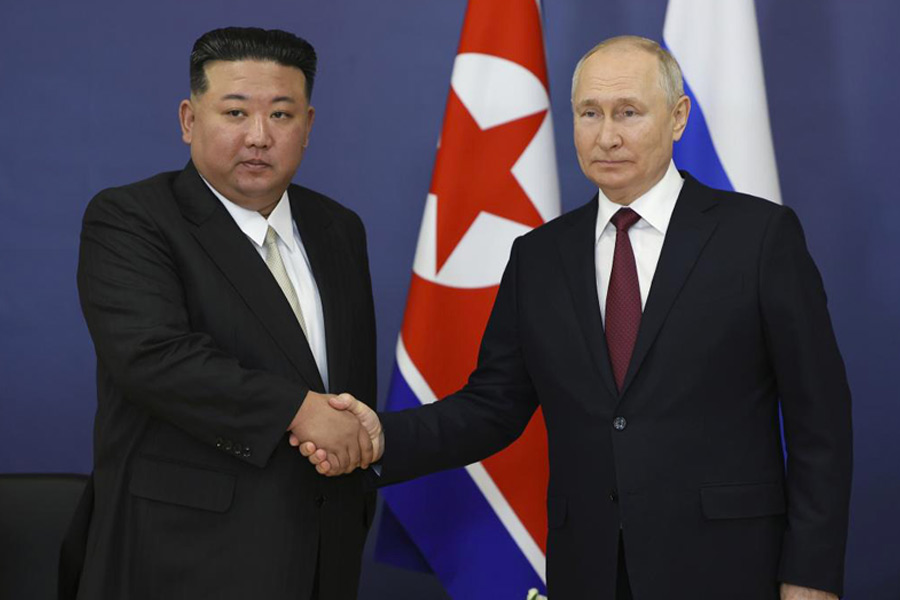Through the most tense encounters with President Vladimir Putin’s Russia over the past decade, there has been one project in which Washington and Moscow have claimed common cause: keeping North Korea from expanding its arsenal of nuclear weapons.
Now, even that has fallen apart.
On Thursday, Russia used its veto power in the United Nations Security Council to kill off a U.N. panel of experts that has been monitoring North Korea’s efforts to evade sanctions over its nuclear program for the past 15 years.
Russia’s discomfort with the group is a new development. Moscow once welcomed the panel’s detailed reports about sanctions violations and considered Pyongyang’s nuclear program to be a threat to global security.
But more recently, the panel has provided vivid evidence of how Russia is keeping the North brimming with fuel and other goods, presumably in return for the artillery shells and missiles that the North Korean leader, Kim Jong Un, is shipping to Russia for use against Ukraine. The group has produced satellite images of ship-to-ship transfers of oil, showing how the war in Ukraine has proved to be a bonanza for the North.
The apparent dismantlement of the panel, which had no enforcement power, is one more piece of evidence of how what was once a global effort to constrain nuclear proliferation has eroded rapidly over the past two years.
“It’s a remarkable shift,” said Robert Einhorn, a State Department official during the Obama administration who is now a senior fellow at the Brookings Institution.
“For much of the post-Cold War period, the United States, Russia and China were partners in dealing with proliferation challenges, especially with North Korea and Iran. They were fully on the American and European side during the Iran negotiations, and helped with North Korea during the ‘fire and fury’ period in 2016 to 2017,” he said, referring to the Obama administration’s final negotiations with the North and former President Donald Trump’s threats when he came to office.
In that era, Russia regularly voted for sanctions against North Korea, as did China, even while they all did a fair bit of business, and more than a little smuggling at sea and over their narrow border crossing, especially a rail bridge where the three all meet.
But as Einhorn noted, that unity has fractured with the reemergence of great power competition. The partnership on containing nuclear threats, even from North Korea, whose nuclear facilities pose a safety challenge to both China and Russia, has vanished.
Russia is now helping North Korea evade sanctions, and neither Russia nor China is actively working to pressure Iran to slow its accumulation of enriched uranium, the critical step needed if it ever decides to build nuclear weapons.
When resolutions have come up to condemn North Korea for its constant barrage of missile tests, Russia and China have rejected them. But eliminating the “experts committee,” which began its work in 2009, cuts new territory in relieving pressure on the country.
The Russian government made no apologies for killing off the panel.
“It is obvious to us that the U.N. Security Council can no longer use old templates in relation to the problems of the Korean Peninsula,” a spokesperson for the Russian Foreign Ministry, Maria Zakharova, was quoted by Reuters as saying. “The United States and its allies have clearly demonstrated that their interest does not extend beyond the task of ‘strangling’ the DPRK by all available means,” she added, using the abbreviation for the Democratic People’s Republic of Korea.
The committee had no great investigative powers, but it was thorough — and its findings often created headlines. It followed oil shipments, and explained what happened when ships turned off their transponders so they would not be tracked at sea. The group looked at banking relationships and luxury goods that made it to North Korea, despite sanctions passed 18 years ago. It also inspired private groups to dig deeper, explaining mysteries like how Kim got his luxury cars.
The experts were outsiders, and their findings were often not adopted. “Everything that goes into the report has to be approved by Security Council members,” Jenny Town, a North Korea expert and senior fellow at the Stimson Center, a nonproliferation think tank, noted Friday. “So while it is an investigative body, its findings exist in a political process.”
Still, the existence of the committee gave an international, neutral imprimatur to the charges of sanctions evasion. “They have been very useful in producing some gravitas on sanctions implementation,” said Town, who is also the director of 38 North, which publishes analysis of North Korea’s capabilities and pronouncements.
The State Department denounced Russia’s decision, saying that the country had “cynically undermined international peace and security,” and declaring that “Russia alone will own the outcome of this veto: a DPRK more emboldened to reckless behavior and destabilizing provocations.”
The New York Times News Service










